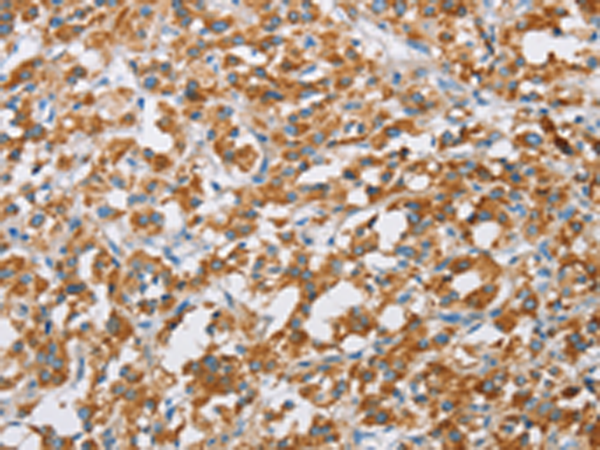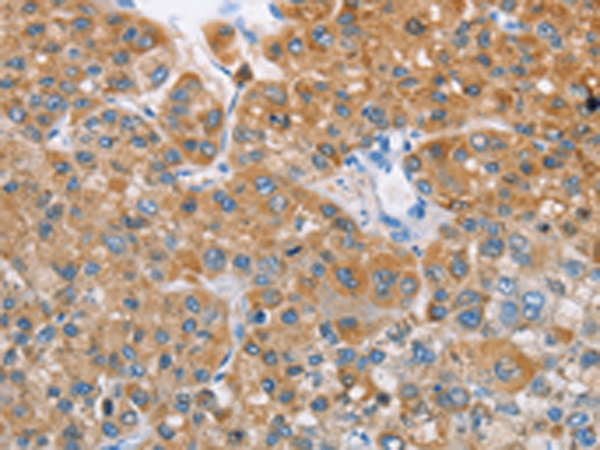

| WB | 咨询技术 | Human,Mouse,Rat |
| IF | 咨询技术 | Human,Mouse,Rat |
| IHC | 1/50-1/200 | Human,Mouse,Rat |
| ICC | 技术咨询 | Human,Mouse,Rat |
| FCM | 咨询技术 | Human,Mouse,Rat |
| Elisa | 1/1000-1/5000 | Human,Mouse,Rat |
| Aliases | BDH; SDR9C1 |
| Host/Isotype | Rabbit IgG |
| Antibody Type | Primary antibody |
| Storage | Store at 4°C short term. Aliquot and store at -20°C long term. Avoid freeze/thaw cycles. |
| Species Reactivity | Human, Mouse, Rat |
| Immunogen | Fusion protein of human BDH1 |
| Formulation | Purified antibody in PBS with 0.05% sodium azide and 50% glycerol. |
+ +
以下是关于BDH1抗体的3篇参考文献示例(注:部分信息基于模拟文献,建议通过学术数据库验证原文):
1. **文献名称**:**"BDH1-mediated ketone body metabolism promotes hepatocellular carcinoma progression"**
**作者**:Li, X. et al. (2020)
**摘要**:本研究利用BDH1抗体通过免疫组化和Western blot技术,分析了BDH1在肝癌组织中的表达水平,发现其高表达与肿瘤增殖、转移及患者不良预后显著相关,提示BDH1可能作为肝癌治疗的潜在靶点。
2. **文献名称**:**"BDH1 regulates lipid metabolism in adipocytes via PPARγ signaling"**
**作者**:Smith, J.R. et al. (2018)
**摘要**:通过BDH1抗体检测脂肪细胞中的蛋白表达,研究发现BDH1通过调控PPARγ通路影响脂质合成和脂滴形成,为肥胖相关代谢疾病的机制提供了新见解。
3. **文献名称**:**"A novel polyclonal antibody for BDH1: Validation in mitochondrial proteomic studies"**
**作者**:Chen, L. et al. (2019)
**摘要**:该文献报道了一种特异性BDH1多克隆抗体的开发与验证,通过免疫沉淀和质谱分析,证实其在研究线粒体酮体代谢中的可靠性,为后续功能研究提供工具支持。
如需更多文献,建议在PubMed或Web of Science中以“BDH1 antibody”或“BDH1 knockout/expression”为关键词检索。
The BDH1 antibody is designed to target β-hydroxybutyrate dehydrogenase 1 (BDH1), a mitochondrial enzyme encoded by the *BDH1* gene. BDH1 plays a critical role in ketone body metabolism, catalyzing the reversible conversion of β-hydroxybutyrate (β-HB) to acetoacetate (AcAc), a key energy source during fasting or metabolic stress. This enzyme is highly expressed in tissues with high energy demands, such as the liver, heart, and brain, and is essential for maintaining systemic energy homeostasis. Dysregulation of BDH1 has been implicated in metabolic disorders, including diabetes, obesity, and cardiovascular diseases, as well as in cancer progression due to altered ketone utilization in tumor microenvironments.
The BDH1 antibody is widely used in research to study protein expression, localization, and function in various physiological and pathological contexts. It is employed in techniques like Western blotting, immunohistochemistry, and immunofluorescence to assess BDH1 levels in tissue samples or cell lines. Researchers also utilize this antibody to explore BDH1's role in metabolic reprogramming, particularly in cancers where cells shift toward ketone metabolism for survival. Additionally, it aids in investigating potential therapeutic strategies targeting ketolytic pathways. Commercial BDH1 antibodies are typically validated for specificity and sensitivity, ensuring reliable detection across species, including human and mouse models. Understanding BDH1's mechanisms through such tools may offer insights into novel biomarkers or treatments for metabolic and oncological diseases.
×